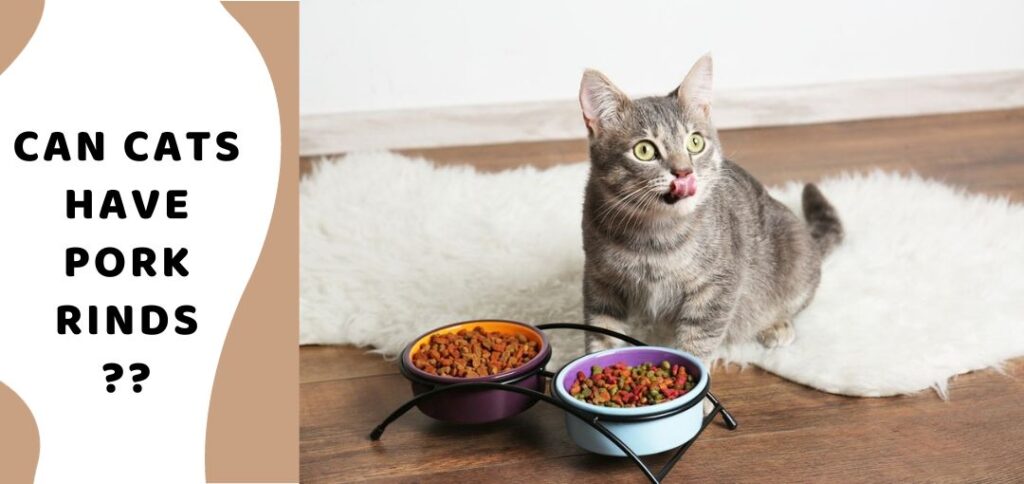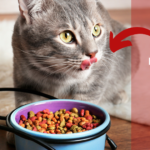
Pork rinds are a popular snack, but can cats have pork rinds as a meal? Let’s first know what pork rinds are. Pork rinds are just pig skin that has been processed into a crispy, aerated, chip-like snack.
According to ASPCA (American Society for the Prevention of Cruelty to Animals), cats can eat pork. But cat owners should still be aware of several aspects of feeding pork rind to their cats. Is it safe for cats? Is this a good diet for cats and healthy for them?
They aren’t necessarily healthy for cats but contain two of the most essential nutrients they need to survive. Please use them as treats because even a tiny amount can fulfill the nutritional requirements of these felines and promote their health.
This article will explain how pork rinds can benefit your cat and harm your cat if fed excessively.
Can Cats Have Pork Rinds? | Pros and Cons, Preparation Steps For Your Cat
Most pet owners wonder if their cats can have pork rinds. Cats are considered carnivorous animals, so their diet should include protein sources such as meat. Pork rinds are rich in protein and other essential nutrients for cats.
Pork rinds can be excellent treats for cats, especially when it is offered in the correct quantity. However, This meal option is very high in fat and sodium, which can adversely affect your feline friend’s health when it is used as a regular part of their diet.
Benefits of Pork Rinds for Your Cat
Since pork rinds have both positive and adverse effects, let’s first look into some of the benefits your cat might have from pork rinds.
- Help your cat maintain a healthy weight
- Support a well-functioning digestive system
- Provide an energy boost
- Contribute to a healthy coat and less shedding
- Reduce the occurrence of hairballs
- Minimize unpleasant bowel odors
Disadvantages of Pork Rinds for Your Cat
On the flip side, excessive consumption of pork rinds can lead to adverse effects on your cat’s health, including:
- Vomiting
- Decreased appetite
- Mood changes like depression
- Muscle tremors
- Diarrhea
- Quick heartbeat
- Extreme tiredness
How To Prepare Pork Rinds For Cats
Although pork rinds are unsafe for cats, you can feed her occasionally as a special treat. But if you want to provide your cat with pork rinds, it’s crucial to make some modifications to ensure their safety. The following are some modifications to be done:
- Remove excess fat from the pork skin to reduce the fat content.
- Cut the pork skin into small, bite-sized pieces to prevent chewing difficulty for your cat.
- Ensure the pork rinds are properly roasted and cooked until they’re puffy and safe.
- Avoid adding salt, chili powder, or any seasonings to the pork rinds for your cat.
Cats can enjoy pork rinds occasionally, but they shouldn’t be a regular part of their diet due to their high fat and sodium content. Always prioritize your cat’s well-being and offer treats like these in moderation.
Why Excessive Consumption of Pork Rinds is Risky for Cats?
We already mentioned that consuming larger amounts of pork rinds may harm your cat’s overall health. Let’s see how some contents typically found in pork rinds affect your cat’s health.
1.High-fat Content
Pork rinds are rich in fats. While some fats are necessary for a cat’s diet, excessive fat can lead to various health problems. If they consume excessive fat, they may experience weight gain and obesity.
Just like in humans, obesity in cats can increase the risk of diabetes. Additionally, a diet high in fat can also increase cholesterol levels, blood pressure, and the risk of heart disease.
2. High Sodium Content
Another risk factor to consider is pork rinds’ high sodium (salt) content. Cats have a lower tolerance for sodium compared to humans. Excessive sodium can lead to serious health issues for your cat, including excessive thirst and frequent urination.
Moreover, increased sodium levels can result in weakness, fatigue, vomiting, and diarrhea in more severe cases. These are signs that your cat’s body struggles due to the excess salt in pork rinds.
3. Seasonings, Additives, and Preservatives
Pork rinds often come with seasonings, additives, and preservatives that can harm your cat. Ingredients like garlic, chili powder, and xylitol can make pork rinds toxic for your pet.
Many of these additives are not suitable for feline consumption. Garlic, for example, contains compounds that can damage a cat’s red blood cells, leading to anemia.
Frequently Asked Questions
Have more questions in mind? Let’s have an overview of some similar questions.
Q: Can Cats Have Pork Rinds?
A: Technically, yes! Cats can have pork rinds in small amounts. It contains rich protein and fat, which can lead your cat to several health problems if fed excessively. So, you should feed pork rinds to your cat occasionally due to its high fat and sodium content.
Q: Are Pork Rinds a Healthy Option for Cats?
Pork rinds are not a healthy food option for your cat. When cats are fed pork rinds in excess, it can be harmful to their health.
Q: Do Cats Love Pork Rinds?
Although each cat’s taste preferences differ, most cats like pork rinds simply because they are made from meat. But this doesn’t mean it should take a massive part of their diet or be fed to them regularly.
Q: What Makes Pork Rinds So Likable for Cats?
It’s meat. That’s the only reason. Cats enjoy eating almost any kind of meat. One of their favorite foods is pork, specifically pork rinds.
Q: Can Cats Eat Raw Pork?
Giving your cat a slice of raw pork is not advised to avoid digestive issues and a higher risk of food poisoning. Cats may catch unusual illnesses, and giving your cat a piece of raw pork could affect it with harmful viruses.
Q: Can Cats Eat Cooked Pork Fat?
Yes, as long as you feed your cat a small amount of cooked pork daily.
Remember that giving your cat too much pork might have adverse side effects. Although it is high in protein, iron, zinc, fat, salt, and vitamins, a small amount would be sufficient.
Final Words
We are on the closure of today’s topic, Can Cats Have Pork Rinds? Your cat can eat pork rinds moderately that are plain and unseasoned, but not too frequently. Cats typically enjoy eating healthful food like pork rinds. Even if it offers some health benefits, these are high in sodium and cholesterol, which might cause severe health issues for your cat.
So, we recommend being conscious before feeding your cat any food enriched with protein and fat. To get more advice, contact us at info@metopet.com.

Patricia White is a pet enthusiast. With 10 years of experience in the pet industry, she brings a wealth of knowledge and expertise to MeToPet. She is honored to be a part of the MTP team and is dedicated to sharing her passion for pets with our readers.









